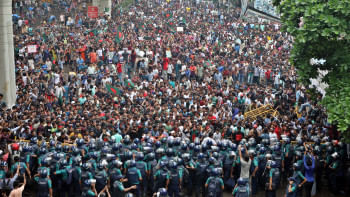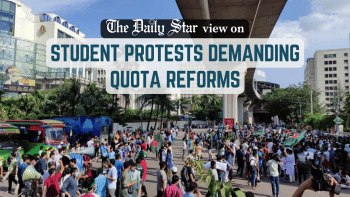Quota reform should be guided by constitutional principles

The Constitution of Bangladesh in Article 27 guarantees equality for all citizens. Equality in public employment is covered within the ambit of this article. However, the framers of the constitution, while placing a greater emphasis on the equality aspect of public employment, reiterated the guarantee of equality in the service of the Republic in a separate article. Article 29 imposes an obligation on the state to ensure equality of opportunity for all citizens in respect of employment.
The combined reading of Article 27 and Article 29 (1) indicates a "right to equality" for all citizens, especially in matters of public employment. To add more to this, Article 29 (2) prohibits discrimination on the grounds of religion, race, caste, sex or place of birth in respect of any employment. As stipulated in our constitution, the right to equality and non-discrimination in matters of employment is also a recognised principle in international human rights instruments, including the Universal Declaration of Human Rights (UDHR) and the International Covenant on Civil and Political Rights (ICCPR).
However, right to equality does not guarantee absolute equality requiring the law to treat all persons alike. All persons in a society are not alike, and nothing can be a greater inequality than to treat unequal as equal. To address this, the right to equality enables a state to take "affirmative action" to reduce or eliminate conditions that cause or help perpetuate discrimination. As per the UN Human Rights Committee, affirmative action refers to undertaking measures of a temporary character, aimed specifically at correcting the position of members of a target group in one or more aspects of their social life, to obtain effective equality.
" layout="left"]In the context of Bangladesh, the constitution allows the state to make special provisions in favour of any backward section of citizens for the purpose of securing their adequate representation in the service of the Republic (Article 29(3)). The special provision may include reservation, preference, concession, and exceptions.
It is worth mentioning that unlike rights to equality and non-discrimination in matters of employment, reservation or quota provisions cannot be claimed as rights or entitlements. The eminent constitutional lawyer, Mahmudul Islam, in his book Constitutional Law of Bangladesh, remarked, "Art 29(3) does not confer any right on anyone, nor impose any constitutional duty on the State to make the reservation."
To attain the broader objectives of effective equality in public employment, the constitution provides an enabling power to the state to undertake special measures in favour of the backward sections. However, this special provision should not be interpreted or realised in such a way that it nullifies constitutional guarantees of rights to equality and non-discrimination in matters of public employment.
A careful analysis of this "special provision" requires a couple of tests to be fulfilled, and these include the test of backwardness and the test of inadequate representation. In outlining the test of backwardness, our constitution does not provide any definition. However, the Indian judiciary in several cases referred to "social, economic, and educational backwardness" to be eligible for differential treatment under the constitution. Here, differential treatment in the form of affirmative action should aim to correct structural inequalities and discrimination and enable remedies to the disadvantaged groups against historical and socio-cultural injustices. Mere economic backwardness would not be sufficient to avail such special benefits. While assessing the criteria of backwardness, the "creamy layer" exclusionary principle should also be considered. It refers to the exclusion of those individual members of society who have already made such significant strides in social, educational and economic progress as to render them undeserving of the benefits of reservation (Indra Sawhney and others v. Union of India). The underlying rationale of excluding the "creamy layer" is to ensure that the benefits of reservation/quota are reaching the truly backward sections of the society.
Considering the test of inadequate representation, fair and adequate representation of the disadvantaged and backward sections in matters of public employment may become essential to ensure better outcomes in decision-making and policy formulation. With such representation, the needs, concerns, and desires of vulnerable and disadvantaged groups are duly reflected and integrated into the socio-legal and development landscape of the country.
It should be kept in mind that the special provision enables differential treatment for the sake of uplifting the interests of backward sections of society and such special measures must be stopped after the objectives for which they were taken have been achieved. This again indicates that special provision should have a temporary character.
This special provision or affirmative action should also confirm the tests of being "reasonable" and "objective." The reasonableness and objectivity should be understood and interpreted considering the socio-economic and cultural advancement of the country. The constitutional principles of equality, non-discrimination, and social justice can guide us in assessing the real necessity and proportionality of reservation/quota for the backward sections of the country.
For the sake of rational and justified quota reform, the provision of affirmative action should be understood considering the ground realities and ideals of our country while addressing the enormous role and sacrifices of our freedom fighters in the Liberation War and reflecting the aspiration and desire of the current youth population.
To accomplish the development milestone by reaping the benefits of the demographic dividend, Bangladesh needs to harness the potential of the youth who constitute around thirty percent of the population. A discriminatory recruitment policy that arguably nullifies the equal opportunity of merit-based candidates in employment might dishearten young people, which will only increase the ongoing alarming trends of the country's brain drain.
We need to understand the crucial role of our talented and skilled minds in ensuring efficient and effective public administration, and accountable governance. Building strong institutions while leaving no one behind has been crucial for the attainment of SDGs that Bangladesh is aiming to achieve by 2030. To attain the objectives of both strong institutions and inclusivity, assistance need not always come in the form of a quota for the backward sections. The government can increasingly provide educational scholarships, special stimulus, and financial assistance, and initiate skill development programmes for the advancement of disadvantaged people.
It is important to note that the provision of affirmative action (quota system) should ensure a balanced combination so that truly backward sections of society are adequately represented in public employment, and at the same time, the potential of merit-based youth candidates is utilised in building strong public institutions and ensuring effective governance.
Mohammad Golam Sarwar, a Chevening & Commonwealth Scholar,is PhD Researcher at SOAS, University of London. He is also an assistant professor (on study leave) at the Department of Law in the University of Dhaka.
Views expressed in this article are the author's own.
Follow The Daily Star Opinion on Facebook for the latest opinions, commentaries and analyses by experts and professionals. To contribute your article or letter to The Daily Star Opinion, see our guidelines for submission.

 For all latest news, follow The Daily Star's Google News channel.
For all latest news, follow The Daily Star's Google News channel. 










Comments